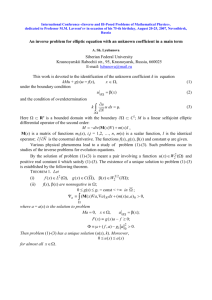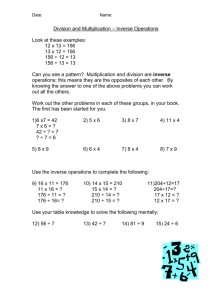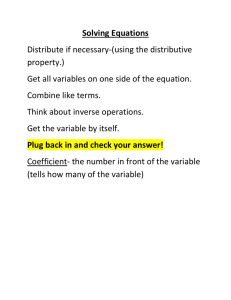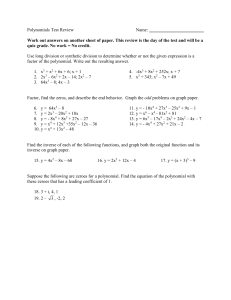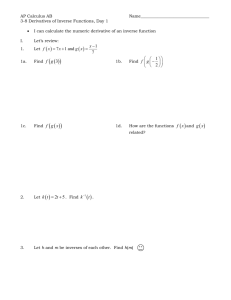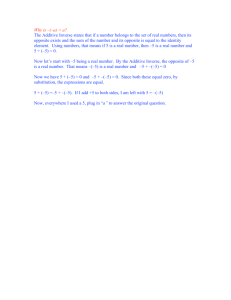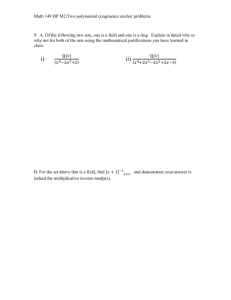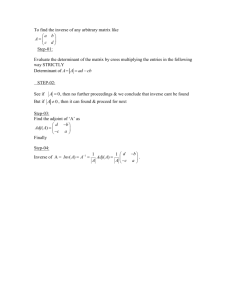absolute value, 30–33 acknowledgments, xix–xx additive inverse
advertisement
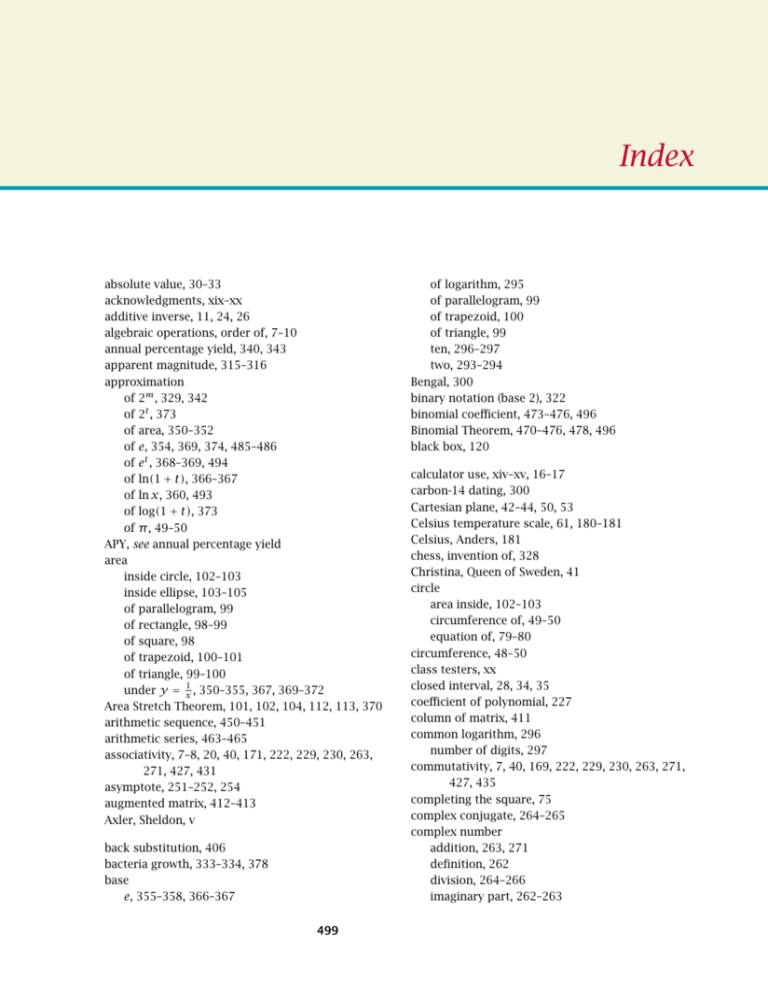
Index absolute value, 30–33 acknowledgments, xix–xx additive inverse, 11, 24, 26 algebraic operations, order of, 7–10 annual percentage yield, 340, 343 apparent magnitude, 315–316 approximation of 2m , 329, 342 of 2t , 373 of area, 350–352 of e, 354, 369, 374, 485–486 of et , 368–369, 494 of ln(1 + t), 366–367 of ln x, 360, 493 of log(1 + t), 373 of π , 49–50 APY, see annual percentage yield area inside circle, 102–103 inside ellipse, 103–105 of parallelogram, 99 of rectangle, 98–99 of square, 98 of trapezoid, 100–101 of triangle, 99–100 1 under y = x , 350–355, 367, 369–372 Area Stretch Theorem, 101, 102, 104, 112, 113, 370 arithmetic sequence, 450–451 arithmetic series, 463–465 associativity, 7–8, 20, 40, 171, 222, 229, 230, 263, 271, 427, 431 asymptote, 251–252, 254 augmented matrix, 412–413 Axler, Sheldon, v back substitution, 406 bacteria growth, 333–334, 378 base e, 355–358, 366–367 499 of logarithm, 295 of parallelogram, 99 of trapezoid, 100 of triangle, 99 ten, 296–297 two, 293–294 Bengal, 300 binary notation (base 2), 322 binomial coefficient, 473–476, 496 Binomial Theorem, 470–476, 478, 496 black box, 120 calculator use, xiv–xv, 16–17 carbon-14 dating, 300 Cartesian plane, 42–44, 50, 53 Celsius temperature scale, 61, 180–181 Celsius, Anders, 181 chess, invention of, 328 Christina, Queen of Sweden, 41 circle area inside, 102–103 circumference of, 49–50 equation of, 79–80 circumference, 48–50 class testers, xx closed interval, 28, 34, 35 coefficient of polynomial, 227 column of matrix, 411 common logarithm, 296 number of digits, 297 commutativity, 7, 40, 169, 222, 229, 230, 263, 271, 427, 435 completing the square, 75 complex conjugate, 264–265 complex number addition, 263, 271 definition, 262 division, 264–266 imaginary part, 262–263 500 Index multiplication, 263–264, 271 multiplicative inverse, 272 real part, 262–263 subtraction, 263 composition, 166–174 decomposing functions, 170–171 not commutative, 170 of a function and its inverse, 185–187 of a polynomial and a rational function, 256 of increasing functions, 205 of linear functions, 175 of more than two functions, 171–172 of one-to-one functions, 191 of polynomials, 242 of rational functions, 256 compound interest, 336–340, 343 continuous compounding, 376–380 doubling money, 378–380 conic section ellipse, 81–83, 103–105 hyperbola, 85–88, 392 parabola, 83–85, 142, 197, 214, 228, 286, 293 continuous function, 236 continuous growth rate, 377–378 continuously compounded interest, 376–377 coordinate axes, 42–44 coordinate plane, 42–44, 50, 53 coordinates, 42–44 cosh, see hyperbolic cosine Cramer’s rule, 404 cube, 280 cube root, 280, 281, 288 cubic formula, 231, 265 Curie, Marie, 299 decibel, 313–315, 320, 321, 325, 326, 348 decimal as infinite series, 489–491 repeating, 490–491 terminating, 490 decomposing functions, 170–171 decreasing function, 200–202, 204–206, 211, 214, 219 degree Celsius, 61, 180–181 Fahrenheit, 61, 180–181 of a polynomial, 227–230 Descartes, René, 41, 43 diagonal of a square matrix, 433 difference quotient, 19, 23, 129, 133, 134, 239, 243, 255, 256, 258, 372, 375 digit, 489 Dilbert, 335, 342, 346, 386 distance between point and line, 77 between points, 46–47 distributive property, 10–11, 431 division of polynomials, 247–249 domain definition, 118 from a table, 128 not specified, 124–125 of a composition, 167 of a polynomial, 227 of a rational function, 245 of an inverse function, 184–185 of ex , 356 of ln, 357 of log2 , 294 of logb , 296 doubling money, 378–380 Dumesnil, Pierre, 41 e approximation of, 368–369 as base for natural logarithm, 355 definition, 354 exponential function, 356–358, 382 first 40 digits, 354 series for, 491 earthquake, 312–313, 319–321, 324, 325, 348 elementary row operation, 415 ellipse area inside, 103–105 equation of, 81–82 focus, 82–83 epsilon, 34, 484 equation solution, 388 solve, 388 Euclid, 117 Euler, Leonard, 262, 492 even function, 152, 155, 156, 164, 176, 205, 289, 360 exponent 0, 217–218 negative integer, 218–219 not associative, 222 not commutative, 222 positive integer, 214–217 Index rational number, 280–285, 288 real number, 282, 285 exponential function, 286–287, 356–358, 382 approximation of, 368–369 graph, 356 in continuous compounding, 376–377 in continuous growth rate, 377–378 series for, 491 exponential growth, 328–340, 342, 382 compound interest, 336–340, 343 continuous compounding, 376–377 continuous growth rate, 377–378 Moore’s Law, 331 population growth, 333–335 factorial, 454–455, 473 Fahrenheit temperature scale, 61, 180–181 Fahrenheit, Daniel Gabriel, 181 Fermat’s Last Theorem, 222 Fibonacci sequence, 455 Fibonacci, Leonardo, 455 finite sequence, 448, 450, 452, 463, 487, 496 flipping graph, see function transformation focus of ellipse, 82–83 of hyperbola, 86–88 function decreasing, 200–202, 204–206, 211, 214, 219 defined by table, 128 definition, 118 even, 152, 155, 156, 164, 176, 205, 289, 360 increasing, 200–202, 204–206, 211, 214, 283, 294, 356, 357 inverse, 180–188 odd, 153, 155, 156, 164, 176, 210, 222, 289, 360 one-to-one, 181–182 piecewise-defined, 119, 130, 138, 189, 194 polynomial, 227 function transformation as composition, 172–174 flipping graph across horizontal axis, 145 flipping graph across vertical axis, 148 horizontal combinations of, 151 shifting graph down, 143 shifting graph left, 145–146 shifting graph right, 146 shifting graph up, 142–143 stretching graph horizontally, 147 stretching graph vertically, 143–144 vertical combinations of, 149–151 Fundamental Theorem of Algebra, 270 Galileo, 105 Gauss, Carl Friedrich, 270, 387 Gaussian elimination, 404–406, 413–418 geometric sequence, 451–453 limit of, 486 sum of, 466–469, 487–489 geometric series, 466–469, 487–489 Google, 354, 404 graph determining range from, 127 flipping, see function transformation horizontal line test, 199–200 of 1/x, 219, 350–355, 366–367, 369–372 of 1/x 2 , 219 of 2x , 286, 293 of 9x , 330 √ of x, 197 of (1 + 1/x)x , 368 of decreasing function, 200–201 of equation, 44–46 of even function, 152 of ex , 356, 358, 368 of function, 121–122 of increasing function, 200–201 of inverse function, 197–198 of linear function, 58 of ln, 357, 358, 366 of log, 318 of log2 , 294, 318 of odd function, 153 of one-to-one function, 199–200 of polynomial, 237 of quadratic expression, 84 of rational function, 253–254 of transformed function, 142–151 of x 2 , 197, 286, 293 of x 3 , x 4 , x 5 , and x 6 , 215 reflecting, see function transformation shifting, see function transformation stretching, see function transformation vertical line test, 124 half-life, 299–300 half-open interval, 28 height of parallelogram, 99 of rectangle, 99 of trapezoid, 100 501 502 Index of triangle, 99–100 Holmes, Sherlock, 5 Hubble telescope, 316 hyperbola, 85–88, 392 focus, 86–88 hyperbolic cosine, 360–361 hyperbolic sine, 360–361, 374 i, 262–270 identity, 388 identity function (I), 169–170, 186 identity matrix (I), 433–435 imaginary part, 262–263 income tax function, 119, 190, 195, 205 increasing function, 200–202, 204–206, 211, 214, 283, 294, 356, 357 inequalities, 25–26 infinite sequence, 448–456 arithmetic sequence, 450–451 geometric sequence, 451–453 limit of, 483–486 recursive sequence, 454–456 sum of, see infinite series infinite series, 487 geometric series, 487–489 special, 491–492 infinity (∞), 28–29, 229, 234–236, 250–252, 448, 485 integer, 2 Intel, 331 interest compound, 336–340 continuouosly compounded, 376–380 simple, 335–337 intersection, 34, 39 interval, 27–32 closed, 28, 34, 35 half-open, 28 open, 28, 34, 35 inverse function, 180–188 composition with, 185–187 domain of, 184–185 from table, 203 graph of, 197–198 notation, 187–188 of 2x , 293–294 of a linear function, 190 of bx , 295–296 of cosh, 361 of decreasing function, 202 of ex , 357–358 of increasing function, 202 of sinh, 361 of x m , 283 range of, 184–185 iPod, 314–315, 451 irrational number, 5–6, 40, 49, 50, 132, 269, 285, 288, 289, 302, 333, 352, 354, 490 √ irrationality of 2, 4–5 irrationality of e, 354 irrationality of π , 49 Jefferson, Thomas, 294 Kepler, Johannes, 81 Khayyam, Omar, 213 Kneller, Godfrey, 447 length of a line segment, 48 of a path or curve, 48–50 Libby, Willard, 300 limit, 483–492 linear equations any number of variables, 402 one variable, 399–400 system of, 403–418 Gaussian elimination, 404–406, 413–418 matrix representation, 412–413 three variables, 402 two variables, 400–401 linear function, 172 lines equation of, 58–60 parallel, 61–62 perpendicular, 62–64, 68, 176 slope, 57–58 ln, see natural logarithm logarithm any base, 295–296 base e, 355–358, 366–367 base ten, 296–297 base two, 293–294 change of base, 316–318 common, 296 number of digits, 297 natural, 355–358, 366–367 of 1, 295 of 1/y, 312 of a power, 297–298 of a product, 310–311 Index of a quotient, 311–312 of the base, 295 loudness, 313–315, 320, 321, 325, 326, 348 magnitude, 315–316 Manhattan alleged sale of, 338 real estate, 342, 346 matrix addition, 426–427 augmented, 412–413 column, 411 diagonal, 433 difference, 427 elementary row operation, 415 equality, 425 Gaussian elimination, 413–418 identity (I), 433–435 inverse, 434–439 invertible, 434 multiplication, 428–432 multiplication by a number, 427–428 product, 428–432 representing a system of linear equations, 412–418 row, 411 scalar multiplication, 427–428 size, 424 subtraction, 427 sum, 426–427 midpoint, 64–66 Moore’s Law, 331 Moore, Gordon, 331 multiplicative inverse of a complex number, 272 of a matrix, 434–439 of a real number, 13–15 Napier, John, 296 natural logarithm algebraic properties, 357 approximation of, 366–367 area interpretation, 355, 369–372 as inverse of exponential function, 357–358 definition, 355 graph, 356–358 inequalities with, 367, 478 series for ln 2, 491–492 negative number, 24–25 negative reciprocal, 64 503 Newton’s method, 455 Newton, Isaac, 447 Nobel Prize, 299, 300 North Star, 315–316, 320, 322, 326 odd function, 153, 155, 156, 164, 176, 210, 222, 289, 360 one-to-one, 182 horizontal line test, 199–200 open interval, 28, 34, 35 origin, 42 page number jokes, 4, 8, 16, 22, 32, 64, 128, 141, 256, 272, 314 parabola, 83–85, 142, 197, 214, 228, 286, 293 parallel lines, 61–62 parallelogram, 99 Parthenon, 1 partial sum, 488 Pascal’s triangle, 471–472, 476, 478 Pascal, Blaise, 471 perimeter, 48–49, 108 perpendicular lines, 62–64, 68, 176 pH scale, 322 photo credits, 497 pi (π ) area inside circle, 102–103, 108 area inside ellipse, 104–105, 108 definition, 49 first 504 digits, 49 irrational, 49 rational approximation, 49–50 series for, 492 piecewise-defined function, 119, 130, 138, 189, 194 Polaris, 315–316, 322 polynomial behavior near ±∞, 234–237 complex conjugate of a zero, 268–269 definition, 227 degree, 227–230 division of, 247–249 factorization, 233–234, 270 Fundamental Theorem of Algebra, 270 graph, 237 root of, 230 zero of, 230–234, 268–270 population growth, 333–335 positive number, 24–25 power, see exponent preface 504 Index to the instructor, xiii–xvii to the student, xxi prime number, 302, 303, 308, 347, 354 principal, 336 Pythagoras, 4 Pythagorean Theorem, 3–4, 46–47, 54, 68, 109 quadratic expression, 77 completing the square, 75–78 graph of, 84 quadratic formula, 78–79, 231, 233, 268 quadratic function, 176 radioactive decay, 299–300 range definition, 126 from a graph, 127 from a table, 128 of an inverse function, 184–185 of cosh, 361 of ex , 356 of ln, 357 of log2 , 294 of logb , 296 of sinh, 361 Raphael, 117 rational exponent, 284–285, 288 rational function behavior near ±∞, 250–253 definition, 245 domain, 245 graph of, 253–254 rational number, 2–6 Rational Zeros Theorem, 241 real exponent, 282, 285 real line, 2–3, 40 real number, 3 real part, 262–263 reciprocal, 13 rectangular coordinates, 42–44 recursively defined sequence, 454–458, 461, 462, 496 reflecting graph, see function transformation repeating decimal, 490–491 reviewers, xx Richter magnitude, 312–313, 319–321, 324, 325, 348 Richter, Charles, 312 right triangle, area of, 100 root of a function, 230 of a number, 280 as inverse function, 283 notation, 282 row of matrix, 411 School of Athens, 117 sequence arithmetic, 450–451 Fibonacci, 455 finite, 448, 450, 452, 463, 487, 496 geometric, 451–453 infinite, 448–456 limit of, 483–486 recursively defined, 454–458, 461, 462, 496 series arithmetic, 463–465 definition, 463 geometric, 466–467, 489 infinite, 487–489 special, 491–492 summation notation, 468–469 set, 27 shifting graph, see function transformation Sigma (Σ), 468–469 simple interest, 335–337 sinh, see hyperbolic sine slope definition, 57–58 equation of a line, 58 parallel lines, 61–62 perpendicular lines, 62–64, 68, 176 solution to an equation, 388 solve an equation, 388 sound intensity, 313–315, 320, 321, 325, 326, 348 Spots, 309 square root definition, 281–283 graph of, 197 of 2 is irrational, 4–5 St. Louis Gateway Arch, 349, 361 star brightness, 315–316 Starry Night, 279 stretching and area, see Area Stretch Theorem stretching graph, see function transformation substitution, to solve system of equations, 392–393 summation notation, 468–469 Sylvester, James, 412 system of equations solve by substitution, 392–393 solve graphically, 391–392 system of linear equations, see linear equations Index table determines domain, 128 determines range, 128 for a function, 128 for an inverse function, 203 terminating decimal, 490 transitivity, 25 trapezoid area of, 100–101 bases of, 100 height of, 100 triangle, area of, 99–100 union, 29–30, 33, 34, 36, 38, 40, 209, 255, 257, 276 Van Gogh, Vincent, 279 vertex of parabola definition, 84 finding by completing the square, 85 vertical line test, 124 Wolfram|Alpha, 17 distance, 52 expand, 18 graph, 45–46, 92, 121–122 is, 46 Show steps, 18 simplify, 18, 247 solve, 33, 184, 231, 389, 404 sum, 469, 479 x-axis, 43 x-coordinate, 44 y-axis, 43 y-coordinate, 44 Zeno’s paradox, 494 zero of a function, 230 of a polynomial, 230–234, 268–270 of a quadratic function, 78–79, 231, 268 ζ(2), 492 ζ(3), 492 ζ(4), 492 ζ(6), 492 Zu Chongzhi, 50 505
